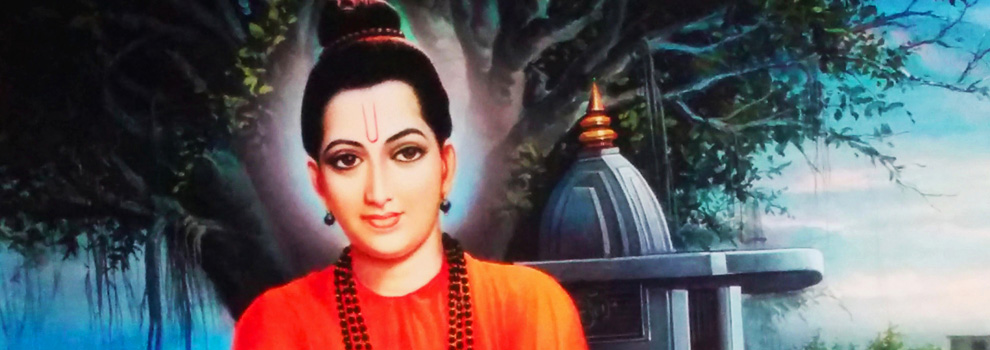Srīpāda Srīvallabha - Father and Mother
“Srīpāda Rājam Sharanam Prapadye”
May Lord Srīpāda protect us
Overview Incarnations Back: Srīpāda - Name | Continue: Srīpāda - Announcement of Birth Pithapuram
 “Yogic lights emerged from the eyes of Appalarāja Sarma and mother Sumatī who were in deep meditation. These lights combined and stayed in the womb of mother Sumatī.”
“Yogic lights emerged from the eyes of Appalarāja Sarma and mother Sumatī who were in deep meditation. These lights combined and stayed in the womb of mother Sumatī.”
Srīpāda Srīvallabha took birth in a very auspicious place called Srī Pīthikapuram; there is already a seat of the Mother in that place since most ancient times. The name of the mother of Srīpāda is Sumatī. “Mati” means the mind; “Sumatī” means the good mind. She was a good-natured lady, simple, austere in her discipline, ever related to the Divine. She never entertained any opinions of others.
Her husband was Appalarāja Sarma. He was a great devotee of Datta and he offered himself to the divine completely. He was a priest; he went from house to house and performed rituals. If someone exploited him, he did not complain. “What I should receive, let the Lord decide. I keep worshipping him and he receives my worship.” He was a deep worshipper offering himself to the Lord who gave him the presence as Kalagni Shamana Dattatreya. It is a dimension of Lord Dattatreya who puts off the fury of time. This means, what he wills that happens through time, through the fire of time, Kalagni.
Sumatī came from a high family and offered herself to the husband who was very humble – his life, his house. Sumatī saw in her husband the kind of righteousness one normally does not see. Everything he thought, spoke and acted was in accordance with the natural law. Her father saw a great yogi in him. The knowers go by the vibrational energies the other carries and not by the objective accomplishments. What is apparent need not be real.
When the couple conceived their first child, they had a blind son. They accepted and continued. Then they had a second son – a lame one. The couple accepted without any complaints and without abandoning their practices in spite of the calamities that happened. Appalarāja Sarma did his daily worships and conducted his duties in the society. Sumatī took care of him and the two children and also took care of the relatives and friends who came home. In ancient India the mother was seen as divine, as the World Mother; the father was seen as the Lord Absolute. They were daily worshipped as the Lord and the Mother. The teacher was seen as another form of the divinity. In ancient India there were no hotels and there was no sale of food. Food was never sold; this was considered a very low act. The lady was taking care of the family and the unexpected visitors coming from other places.
Continue: Srīpāda - Announcement of Birth
Sources:
- K. Parvathi Kumar: Notes from seminars. The World Teacher Trust - Dhanishta, Visakhapatnam, India worldteachertrust.org
- Shankar Bhatt: Srīpāda Srīvallabha Charitāmrutam







